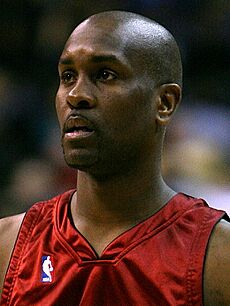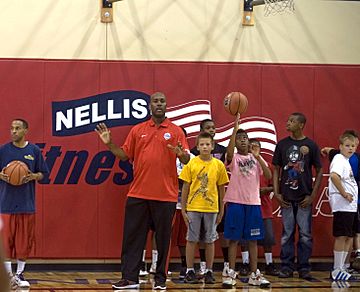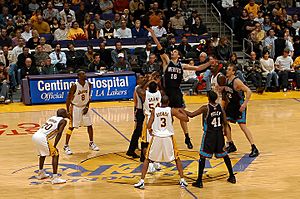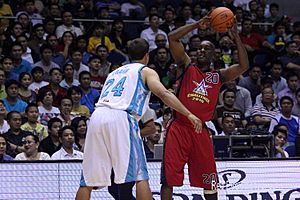Gary Payton facts for kids

Payton with the Miami Heat in 2007
|
||||||||||||||||||||||||||||||||
| Personal information | ||||||||||||||||||||||||||||||||
|---|---|---|---|---|---|---|---|---|---|---|---|---|---|---|---|---|---|---|---|---|---|---|---|---|---|---|---|---|---|---|---|---|
| Born | July 23, 1968 Oakland, California, U.S. |
|||||||||||||||||||||||||||||||
| High school | Skyline (Oakland, California) | |||||||||||||||||||||||||||||||
| Listed height | 6 ft 4 in (1.93 m) | |||||||||||||||||||||||||||||||
| Listed weight | 190 lb (86 kg) | |||||||||||||||||||||||||||||||
| Career information | ||||||||||||||||||||||||||||||||
| College | Oregon State (1986–1990) | |||||||||||||||||||||||||||||||
| NBA Draft | 1990 / Round: 1 / Pick: 2nd overall | |||||||||||||||||||||||||||||||
| Selected by the Seattle SuperSonics | ||||||||||||||||||||||||||||||||
| Pro career | 1990–2007 | |||||||||||||||||||||||||||||||
| Career history | ||||||||||||||||||||||||||||||||
| As player: | ||||||||||||||||||||||||||||||||
| 1990–2003 | Seattle SuperSonics | |||||||||||||||||||||||||||||||
| 2003 | Milwaukee Bucks | |||||||||||||||||||||||||||||||
| 2003–2004 | Los Angeles Lakers | |||||||||||||||||||||||||||||||
| 2004–2005 | Boston Celtics | |||||||||||||||||||||||||||||||
| 2005–2007 | Miami Heat | |||||||||||||||||||||||||||||||
| As coach: | ||||||||||||||||||||||||||||||||
| 2017–2021 | 3 Headed Monsters | |||||||||||||||||||||||||||||||
| 2022–2024 | Bivouac | |||||||||||||||||||||||||||||||
| Career highlights and awards | ||||||||||||||||||||||||||||||||
As player:
|
||||||||||||||||||||||||||||||||
| Career NBA statistics | ||||||||||||||||||||||||||||||||
| Points | 21,813 (16.3 ppg) | |||||||||||||||||||||||||||||||
| Rebounds | 5,269 (3.9 rpg) | |||||||||||||||||||||||||||||||
| Assists | 8,966 (6.7 apg) | |||||||||||||||||||||||||||||||
|
Medals
|
||||||||||||||||||||||||||||||||
Gary Dwayne Payton Sr. (born July 23, 1968) is a former American professional basketball player. He played as a point guard in the National Basketball Association (NBA). Many people think he is one of the best point guards ever.
He is most famous for playing 13 years with the Seattle SuperSonics. There, he set team records for assists and steals. He also led them to the 1996 NBA Finals. Gary Payton also played for the Milwaukee Bucks, Los Angeles Lakers, Boston Celtics, and Miami Heat. He won an NBA championship with the Heat in 2006.
Payton was nicknamed "the Glove" because of his amazing defensive skills. He was added to the Naismith Basketball Hall of Fame in 2013. In October 2021, Payton was also named to the NBA 75th Anniversary Team.
He was the first point guard to win the NBA Defensive Player of the Year award. For 39 years, he was the only point guard to win it, until Marcus Smart won in 2022. Payton was chosen for the NBA All-Defensive First Team nine times. This is an NBA record he shares with Michael Jordan, Kevin Garnett, and Kobe Bryant. He was also a nine-time NBA All-Star and a nine-time All-NBA Team member.
Contents
Early Life and College Years
Growing Up in Oakland
Gary Dwayne Payton was born on July 23, 1968, in Oakland, California. He went to Skyline High School. There, he was a great basketball player, along with future NBA player Greg Foster.
Playing for Oregon State
Payton went to Oregon State University in Corvallis, Oregon. In high school, his grades dropped, and he couldn't play basketball for a while. His dad helped him focus on school, and he was able to play again.
During his four years at Oregon State, he became one of the best players in the school's history. In his senior year (1989–90), Sports Illustrated magazine featured him as the best college basketball player in the country. He won many awards, including Pac-10 Player of the Year in 1990. He also won Pac-10 Defensive Player of the Year and Freshman of the Year in 1987.
When he graduated, Payton held school records for points, field goals, three-point field goals, assists, and steals. He still holds most of these records today. He was inducted into Oregon State's Sports Hall of Fame in 1996.
Professional Basketball Career
Seattle SuperSonics (1990–2003)
The Seattle SuperSonics picked Gary Payton as the second overall player in the 1990 NBA draft. He played his first 12 and a half seasons with the Sonics.
In his third game, Payton had his first "double-double." This means he got double-digit numbers in two stats, like 13 points and 10 assists. On February 23, 1991, he got his first "triple-double." This means he had double-digit numbers in three stats: 18 points, 10 rebounds, and 11 assists.
Payton became one of the best point guards in the league during the 1990s. He and Shawn Kemp were a famous duo known as the "Sonic Boom." Their coach was George Karl. In 1996, the SuperSonics won a team record 64 games. They then reached the 1996 NBA Finals, but lost to Michael Jordan's Chicago Bulls in six games. Payton was assigned to guard Jordan in the later games, which helped the Sonics win two games.
Milwaukee Bucks (2003)
In the middle of the 2002–03 NBA season, Payton was traded to the Milwaukee Bucks. He joined his former coach, George Karl. Payton played 28 games for the Bucks, averaging 19.6 points and 7.4 assists per game. The Bucks made it to the playoffs but lost in the first round.
Los Angeles Lakers (2003–2004)
Before the 2003–04 NBA season, Payton signed with the Los Angeles Lakers. He joined Karl Malone to try and win an NBA Championship. Payton started all 82 games. He averaged 14.6 points and 5.5 assists. He found it a bit hard to play in coach Phil Jackson's "triangle offense." This style limited how much he could handle the ball.
Even with injuries to star players like Shaquille O'Neal and Kobe Bryant, the Lakers won 56 games. They reached the 2004 NBA Finals but lost to the Detroit Pistons in five games.
Boston Celtics (2004–2005)
Before the 2004–05 NBA season, the Lakers traded Payton to the Boston Celtics. He wasn't happy about the trade at first, but he joined the team. He started as the Celtics' point guard. In February 2005, Payton was traded to the Atlanta Hawks, but they quickly let him go. A week later, he returned to Boston as a free agent. He started all 77 games he played for Boston.
Miami Heat (2005–2007)
On September 22, 2005, Payton signed with the Miami Heat. He joined former teammates Antoine Walker and Shaquille O'Neal. He was a backup player to Jason Williams. Payton played an important role in the playoffs, especially in the fourth quarter of close games.
In Game 4 of the semifinals, Payton made a key three-pointer to help the Heat win. In the NBA Finals against the Dallas Mavericks, the Heat were down 0-2. In Game 3, Payton made a game-winning shot to help Miami avoid falling behind 0-3. The Heat won the series in six games, giving Payton his first and only NBA championship.
Payton re-signed with the Heat for the next season. He continued to move up in NBA history lists for games played, minutes played, and points scored.
Playing for Team USA
Payton was part of the United States Men's Olympic Basketball Teams that won gold medals. He won gold at the 1996 Atlanta Olympics and the 2000 Sydney Olympics.
Player Style and Personality
His Nickname: "The Glove"
Gary Payton was known for his strong defense. His nickname "The Glove" became popular during the 1993 Western Conference Finals. It meant he could "glove" or stick to his opponents, making it very hard for them to score.
Many experts consider Payton one of the best point guards ever. Gail Goodrich, a Hall of Famer, said Payton was "probably as complete a guard as there ever was."
Talking on the Court
Payton was also famous for his "trash-talk." This means he would talk to his opponents during games to try and get into their heads. He once said, "I never take it too far...I just try to talk and get their mind off the game." He has one of the highest numbers of technical fouls in NBA history.
Durability and Strength
Payton was very tough and rarely missed games. In his 17-year career, he missed only 25 games. At one point, he played 356 games in a row. This shows how strong and reliable he was.
Payton vs. Jordan
Payton is known as one of the best defenders against Michael Jordan. They had a big rivalry, especially in the 1996 NBA Finals. Both players were great at defense and loved to compete.
In the 1996 Finals, Seattle's coach, George Karl, decided to have Payton guard Jordan. Even though the Bulls won the series, Payton's defense made it very hard for Jordan to score. Jordan had some of his lowest-scoring games in the Finals when Payton was guarding him.
Coaching Career
Payton was the head coach at Lincoln University in Oakland for three seasons. In 2024, he became the head coach for the men's basketball team at the nearby College of Alameda.
Life Off the Court

Family Life
Gary Payton is the son of Al and Annie Payton. He married Monique James in 1997. They have three children: Gary II, Julian, and Raquel. His son, Gary Payton II, is also an NBA player. He won an NBA Championship with the Golden State Warriors.
After Playing Basketball
After retiring from playing, Payton worked as a basketball analyst for TV channels like NBA TV and The NBA on TNT. He also became an analyst for Fox Sports 1.
Helping the Community
Payton has given a lot of his time and money to help others. In 1996, he started The Gary Payton Foundation. This foundation helps provide safe places for kids to play and encourages young people in his hometown of Oakland to stay in school. He also supports the Boys & Girls Club of America and the Make-a-Wish Foundation.
In 1999, he wrote a children's book called Confidence Counts. It teaches kids about the importance of confidence through stories from his own life.
Supporting Seattle Basketball
When the Seattle SuperSonics team moved to Oklahoma City, Payton said he wanted his retired jersey number to stay in Seattle. He wants it to be part of Seattle's basketball history, not the new team's. The SuperSonics' name, colors, and trophies are still in Seattle for a future team.
Payton is working to bring an NBA team back to Seattle. He is featured in a documentary called Sonicsgate, which is about the team moving away. When the documentary won an award, Payton's acceptance speech was just five words: "Bring back our Seattle SuperSonics."
Career Statistics
NBA Regular Season
| Year | Team | GP | GS | MPG | FG% | 3P% | FT% | RPG | APG | SPG | BPG | PPG |
|---|---|---|---|---|---|---|---|---|---|---|---|---|
| 1990–91 | Seattle | 82* | 82 | 27.4 | .450 | .077 | .711 | 3.0 | 6.4 | 2.0 | .2 | 7.2 |
| 1991–92 | Seattle | 81 | 79 | 31.5 | .451 | .130 | .669 | 3.6 | 6.2 | 1.8 | .3 | 9.4 |
| 1992–93 | Seattle | 82 | 82 | 31.1 | .494 | .206 | .770 | 3.4 | 4.9 | 2.2 | .3 | 13.5 |
| 1993–94 | Seattle | 82* | 82 | 35.1 | .504 | .278 | .595 | 3.3 | 6.0 | 2.3 | .2 | 16.5 |
| 1994–95 | Seattle | 82* | 82* | 36.8 | .509 | .302 | .716 | 3.4 | 7.1 | 2.5 | .2 | 20.6 |
| 1995–96 | Seattle | 81 | 81 | 39.0 | .484 | .328 | .748 | 4.2 | 7.5 | 2.9* | .2 | 19.3 |
| 1996–97 | Seattle | 82 | 82* | 39.2 | .476 | .313 | .715 | 4.6 | 7.1 | 2.4 | .2 | 21.8 |
| 1997–98 | Seattle | 82* | 82* | 38.4 | .453 | .338 | .744 | 4.6 | 8.3 | 2.3 | .2 | 19.2 |
| 1998–99 | Seattle | 50* | 50* | 40.2 | .434 | .295 | .721 | 4.9 | 8.7 | 2.2 | .2 | 21.7 |
| 1999–00 | Seattle | 82 | 82* | 41.8 | .448 | .340 | .735 | 6.5 | 8.9 | 1.9 | .2 | 24.2 |
| 2000–01 | Seattle | 79 | 79 | 41.1 | .456 | .375 | .766 | 4.6 | 8.1 | 1.6 | .3 | 23.1 |
| 2001–02 | Seattle | 82 | 82 | 40.3 | .467 | .314 | .797 | 4.8 | 9.0 | 1.6 | .3 | 22.1 |
| 2002–03 | Seattle | 52 | 52 | 40.8 | .448 | .298 | .692 | 4.8 | 8.8 | 1.8 | .2 | 20.8 |
| Milwaukee | 28 | 28 | 38.8 | .466 | .294 | .746 | 3.1 | 7.4 | 1.4 | .3 | 19.6 | |
| 2003–04 | L.A. Lakers | 82 | 82 | 34.5 | .471 | .333 | .714 | 4.2 | 5.5 | 1.2 | .2 | 14.6 |
| 2004–05 | Boston | 77 | 77 | 33.0 | .468 | .326 | .761 | 3.1 | 6.1 | 1.1 | .2 | 11.3 |
| 2005–06† | Miami | 81 | 25 | 28.5 | .420 | .287 | .794 | 2.9 | 3.2 | .9 | .1 | 7.7 |
| 2006–07 | Miami | 68 | 28 | 22.1 | .393 | .260 | .667 | 1.9 | 3.0 | .6 | .0 | 5.3 |
| Career | 1,335 | 1,233 | 35.3 | .466 | .317 | .729 | 3.9 | 6.7 | 1.8 | .2 | 16.3 | |
| All-Star | 9 | 2 | 20.8 | .436 | .273 | 1.000 | 3.3 | 8.1 | 2.1 | .0 | 9.4 | |
NBA Playoffs
| Year | Team | GP | GS | MPG | FG% | 3P% | FT% | RPG | APG | SPG | BPG | PPG |
|---|---|---|---|---|---|---|---|---|---|---|---|---|
| 1991 | Seattle | 5 | 5 | 27.0 | .407 | .000 | 1.000 | 2.6 | 6.4 | 1.6 | .2 | 4.8 |
| 1992 | Seattle | 8 | 8 | 27.6 | .466 | .000 | .583 | 2.6 | 4.8 | 1.0 | .3 | 7.6 |
| 1993 | Seattle | 19 | 19 | 31.8 | .443 | .167 | .676 | 3.3 | 3.7 | 1.8 | .2 | 12.3 |
| 1994 | Seattle | 5 | 5 | 36.2 | .493 | .333 | .421 | 3.4 | 5.6 | 1.6 | .4 | 15.8 |
| 1995 | Seattle | 4 | 4 | 43.0 | .478 | .200 | .417 | 2.5 | 5.3 | 1.3 | .0 | 17.8 |
| 1996 | Seattle | 21 | 21 | 43.4 | .485 | .410 | .633 | 5.1 | 6.8 | 1.8 | .3 | 20.7 |
| 1997 | Seattle | 12 | 12 | 45.5 | .412 | .333 | .820 | 5.4 | 8.7 | 2.2 | .3 | 23.8 |
| 1998 | Seattle | 10 | 10 | 42.8 | .475 | .380 | .940 | 3.4 | 7.0 | 1.8 | .1 | 24.0 |
| 2000 | Seattle | 5 | 5 | 44.2 | .442 | .391 | .769 | 7.6 | 7.4 | 1.8 | .2 | 25.8 |
| 2002 | Seattle | 5 | 5 | 41.4 | .425 | .267 | .586 | 8.6 | 5.8 | .6 | .4 | 22.2 |
| 2003 | Milwaukee | 6 | 6 | 41.8 | .429 | .067 | .700 | 3.0 | 8.7 | 1.3 | .2 | 18.5 |
| 2004 | L.A. Lakers | 22 | 22 | 35.1 | .366 | .250 | .750 | 3.3 | 5.3 | 1.0 | .2 | 7.8 |
| 2005 | Boston | 7 | 7 | 34.1 | .446 | .071 | .833 | 4.1 | 4.6 | .9 | .1 | 10.3 |
| 2006† | Miami | 23 | 0 | 24.3 | .422 | .293 | .720 | 1.7 | 1.6 | 1.0 | .1 | 5.8 |
| 2007 | Miami | 2 | 0 | 16.0 | .000 | .000 | – | 2.0 | 1.5 | .0 | .0 | .0 |
| Career | 154 | 129 | 35.6 | .441 | .315 | .706 | 3.7 | 5.3 | 1.4 | .2 | 14.0 | |
College Statistics
| Year | Team | GP | GS | MPG | FG% | 3P% | FT% | RPG | APG | SPG | BPG | PPG |
|---|---|---|---|---|---|---|---|---|---|---|---|---|
| 1986–87 | Oregon State | 30 | 30 | 37.2 | .459 | .371 | .671 | 4.0 | 7.6 | 1.9 | .7 | 12.5 |
| 1987–88 | Oregon State | 31 | 31 | 38.0 | .489 | .397 | .699 | 3.3 | 7.4 | 2.3 | .4 | 14.5 |
| 1988–89 | Oregon State | 30 | 30 | 38.0 | .475 | .385 | .677 | 4.1 | 8.1 | 3.0 | .6 | 20.1 |
| 1989–90 | Oregon State | 29 | 29 | 37.8 | .504 | .333 | .690 | 4.7 | 8.1 | 3.4 | .5 | 25.7 |
| Career | 120 | 120 | 37.7 | .485 | .369 | .684 | 4.0 | 7.8 | 2.7 | .5 | 18.1 | |
Awards and Achievements
NBA Highlights
- NBA champion: 2006
- NBA Defensive Player of The Year: 1996
- 9-time NBA All-Star: 1994, 1995, 1996, 1997, 1998, 2000, 2001, 2002, 2003
- 9-time All-NBA Team member:
- First Team: 1998, 2000
- Second Team: 1995, 1996, 1997, 1999, 2002
- Third Team: 1994, 2001
- 9-time All-Defensive First Team member: 1994, 1995, 1996, 1997, 1998, 1999, 2000, 2001, 2002 (shares record for selections with Michael Jordan, Kevin Garnett, and Kobe Bryant)
- NBA All-Rookie Second Team: 1991
- Led NBA in assists: 1999–2000 (732)
- Led NBA in steals: 1995–96 (231)
- Led NBA in three-pointers made: 1999–2000 (177)
- NBA 75th Anniversary Team: 2021
Other Honors
- Two-time Olympic gold medalist with the United States national team: 1996 Olympic Games (Atlanta) and 2000 Olympic Games (Sydney).
- Ranked #39 on SLAM's Top 100 NBA Players of All Time in 2018.
- Ranked #10 on ESPN's Top 10 NBA Point Guards of All Time.
- In a 2006 poll, 48.1% of ESPN.com readers voted Payton the "best defender" among top point guards.
- In 2008, Espn.com named Payton the best #2 draft pick in NBA history during the "lottery era" (1985–present).
- Payton is tied for #1 in All-Star game free throw percentage, never missing a free throw in 8 attempts.
- In 2006, TNT chose Payton as one of the next 10 players to be added to the list of 50 Greatest Players in NBA History.
- The Seattle Mayor's Office declared June 6, 2000, as "Gary Payton Day."
See also
 In Spanish: Gary Payton para niños
In Spanish: Gary Payton para niños
- List of NBA career games played leaders
- List of NBA career scoring leaders
- List of NBA career assists leaders
- List of NBA career steals leaders
- List of NBA career minutes played leaders
- List of NBA career playoff assists leaders
- List of NBA career playoff steals leaders
- List of NCAA Division I men's basketball career assists leaders
- List of NCAA Division I men's basketball career steals leaders



